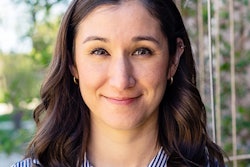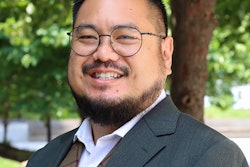Title: Professor of Law, Northwestern Pritzker School of Law
Tenured: Yes
Age: 38
Education: B.A., political science, Stanford University; M.A., sociology, Stanford University; and J.D., Yale Law School
Career mentors: Amna Akbar, The Ohio State University; Guy-Uriel Charles, Harvard Law School; and Devon Carbado, UCLA.
Words of wisdom/advice for new faculty members: “Grow where you’re planted.”
By the time she turned 9 years old, Jamelia N. Morgan was certain that she wanted to be a lawyer. As a child, there were no shortages of Black lawyers within her reach.
“I grew up in Los Angeles in the early 1990s, and we had Johnnie Cochran on T.V. every other week, so I had an idea of Black lawyers being a thing,” says Morgan, who also assumed the role of teacher during her playtime with the neighborhood children. “I definitely didn’t think I was going to be a law professor, but I always wanted to be a teacher,” she says.
Fast forward a few decades, and Morgan has successfully been able to integrate her love for both professions. “I see it as a combination of two early aspirations that I had as a kid,” she says matter-of-factly.
After practicing law for five years, the civil rights attorney has fully transitioned to the classroom where she has been able to take a broad and comprehensive look at the law and its impact on society, particularly as it relates to pressing social justice issues affecting the lives of people of color, women with disabilities, LGBTQIA+ people with disabilities, and low-income people with disabilities.
She has been laser focused as a critical scholar on examining how the law sometimes fails to remedy societal harms.
“There were so many areas of law that I thought deserved critical examination,” says Morgan. “Legal scholars write about law. It’s a great way for people who are reform-minded to change the law and have an influence. A lot of the nascent ideas come from legal scholars.”
And that’s what Morgan has been doing as a professor of law and founding director of the Center for Racial and Disability Justice at Northwestern University, a position she has held since 2022. In this role, she has been able to champion equity-minded solutions to some of the nation’s most vexing challenges. Along the way, she distinguished herself by writing and lecturing about current issues in the news, including reproductive and voting rights and the criminalization of disability.
The center’s mission is ambitious: to look at broad social problems at the intersection of racial and disability justice, “which allows us to recognize that people have intersectional identities and experience overlapping forms of oppression,” says Morgan.
For her part, Morgan and the center have already started to make a difference and have caught the attention of other scholars and policy influences, says Paul A. Gowder, a Professor of Law and associate dean of research and intellectual life at Northwestern’s Pritzker School of Law.
“Professor Jamelia Morgan, although relatively new to the academy, has produced a body of scholarship that has had outsized impact,” says Gowder, who points out that Morgan was recently lauded by the Association of American Law Schools (AALS) with its Deborah L. Rhode Award, named after the late trailblazing lawyer and scholar who served as the Ernest W. McFarland Professor of Law at Stanford Law School and was a past president of the AALS. “As a leading scholar on disability in criminal justice, Professor Morgan has advanced a program of understanding the impact of not just disability, but also disability in the context of race and gender, that contributes a deeper understanding of the social construction of the entire criminal process as well as a blueprint for reform.”
Having served as an associate director of the African American Policy Forum and research assistant to prominent legal scholar Kimberlé W. Crenshaw, Morgan says that her future career and educational path remains wide open, including the possibility of someday pursuing a Ph.D.
“I think the more immediate goal is to write the book,” says Morgan. “There’s been a book in my head for years, and I want to sit down and write it on the other side of tenure as the demands to publish every year is somewhat lessened.”
But more than anything else, Morgan says, she’s fed by the opportunity that she gets each day to help influence conversations about the law and its ability to help shape public policy.
“I can do careful, rigorous research with an eye toward what are the pressing social justice issues of the day,” she says, “and really trying to understand the nature of injustice to me, really promotes justice.”















